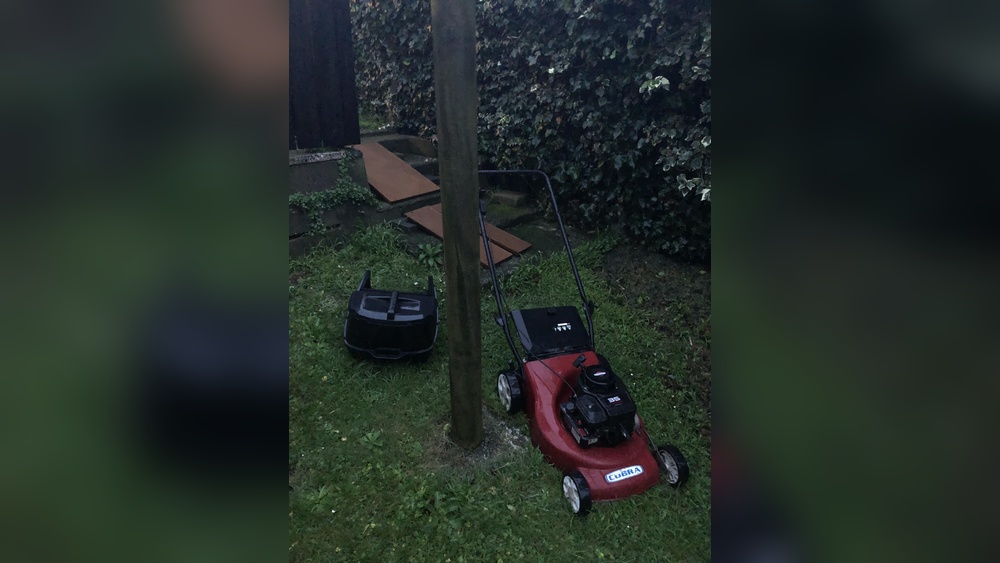As an Amazon Associate, I earn from qualifying purchases.
You’ve probably wondered: will your lawn mower get ruined if it’s caught in the rain? It’s a common worry, especially here in Austin, Texas, where sudden showers can surprise you.
You want your mower to last for years without costly repairs or frustrating breakdowns. But how much rain is too much? Can a little drizzle really cause damage, or is your mower tougher than you think? Keep reading, and you’ll discover the surprising truth about rain and your lawn mower—plus simple tips to protect your investment and keep your lawn looking great no matter the weather.

Rain Impact On Lawn Mowers
Rain can affect lawn mowers in different ways depending on intensity and duration. Understanding how rain impacts your mower helps you protect it better.
Some rain exposure may cause minor issues, while heavy or long exposure can lead to serious damage. Let’s explore these effects in detail.
Effects Of Light Rain
Light rain usually causes little harm to a lawn mower. Most mowers have some water resistance in their design.
A brief shower may leave a wet surface, but internal parts often stay dry. Minor moisture on the blades or deck can dry quickly without causing rust.
Running a mower in light rain can make cutting less effective. Wet grass clumps and clogs the mower deck.
It is best to wipe off moisture and let the mower dry after light rain. This prevents buildup and keeps parts in good shape.
Consequences Of Heavy Or Prolonged Exposure
Heavy or long rain exposure risks serious damage to lawn mowers. Water can reach the engine, spark plug, and fuel system.
Moisture inside the engine may cause starting problems or rust. Electrical parts can short-circuit or corrode.
Fuel contamination may lead to poor performance or engine failure. Metal parts exposed to constant moisture can develop rust and weaken.
Leaving a mower out in heavy rain repeatedly shortens its lifespan. Covering or storing the mower indoors prevents costly repairs.

Fuel System Vulnerability
The fuel system of a lawn mower is sensitive to water exposure. Rain can cause problems that stop your mower from running well. Protecting this part is important to keep your mower working longer.
Water Contamination Risks
Rainwater can enter the fuel tank through open caps or leaks. Water mixes with gasoline and causes contamination. This mix prevents the fuel from burning properly in the engine. Contaminated fuel can clog the fuel filter and carburetor. These blockages reduce fuel flow and cause the mower to stall or fail to start.
Engine Performance Issues
Water in the fuel system leads to poor engine performance. The mower may run rough or lose power during use. It may also produce black smoke or backfire. Continuous water exposure damages engine parts over time. This damage results in expensive repairs or even engine replacement.
Electrical Components And Moisture
Electrical parts in a lawn mower are sensitive to water. Moisture can cause short circuits, corrosion, and malfunctions. Protecting these components is crucial to keep the mower working well. Understanding how water affects the electrical system helps you avoid costly repairs.
Waterproofing Limits
Lawn mowers have some water resistance but are not fully waterproof. Manufacturers add seals and covers to protect wires and connections. These measures help against light rain or splashes. Heavy rain or soaking can overwhelm these protections. Water can seep into switches, ignition systems, and battery compartments. Once moisture enters, it may cause rust or electrical failure. Avoid running or storing the mower in wet conditions for long periods.
Common Electrical Failures After Rain
Water exposure often leads to starting problems. The ignition coil or spark plug may get wet and fail to produce a spark. Moisture can cause wiring shorts, making the mower stop suddenly. Corrosion on terminals reduces electrical flow and damages parts over time. Sensors and switches may also malfunction after rain. Drying the mower quickly and checking electrical parts can prevent damage. Regular maintenance helps detect issues early and extends the mower’s life.
Rust And Corrosion Problems
Rust and corrosion are common problems for lawn mowers exposed to rain. Moisture causes metal parts to oxidize, which weakens the mower’s structure. Rust can spread quickly if not treated, leading to costly repairs or replacement. Regular exposure to water increases the risk of damage to key components. Protecting your mower from rust extends its life and keeps it running smoothly.
Areas Prone To Rust
Blade and deck are most vulnerable to rust. These parts sit close to wet grass and soil. The engine housing can also develop rust spots. Bolts, screws, and other fasteners are often metal and can corrode. Areas where paint has chipped off face a higher risk. Water collects in small crevices, making rust more likely.
Preventive Maintenance Tips
Keep your mower dry after use. Wipe down the deck and blades to remove moisture. Store the mower in a covered, dry place. Use rust-resistant spray on metal parts regularly. Check for paint chips and touch up with rust-proof paint. Clean the mower thoroughly after cutting wet grass. Regular maintenance slows down rust and corrosion.
Mowing Wet Grass
Mowing wet grass can be tempting after a rain shower. The lawn looks lush and ready for trimming. Still, cutting grass when it is wet brings unique challenges. Both the lawn and the mower face risks. Understanding these can help protect your equipment and keep your yard healthy.
Challenges And Risks
Wet grass clumps easily, causing uneven cuts. The mower blade may clog with stuck grass. Slippery ground increases the chance of mower slips and accidents. Wet grass blades bend instead of cutting cleanly. This results in a ragged lawn appearance. Wet grass also strains the mower’s engine and parts. It requires more power to cut thick, moist grass. This can cause overheating or damage. Operating a mower in wet conditions may shorten its lifespan.
Impact On Lawn And Equipment
Mowing wet grass can harm the lawn’s health. Torn grass blades take longer to heal and invite disease. Soil compaction happens as wet ground is softer. Heavy mower wheels press down and crush soil air pockets. This limits root growth and water absorption. Wet grass clippings can clump and suffocate the lawn. For equipment, water can reach the engine and spark plug. This may cause rust or starting problems. Electrical parts inside the mower risk short circuits. Protecting your mower from moisture is key to its longevity.
Protecting Your Lawn Mower From Rain
Protecting your lawn mower from rain is essential for its long life. Rain can cause rust, damage to the engine, and electrical problems. Taking simple steps can keep your mower safe and working well.
Storage Solutions
Store your lawn mower in a dry place like a garage or shed. Avoid leaving it outside where rain can reach it. If indoor space is limited, consider a small storage box made for garden tools. Elevate the mower off the ground to prevent moisture buildup underneath. Proper storage reduces the risk of rust and keeps parts dry.
Covering And Cleaning Practices
Use a waterproof cover to protect your mower if storage indoors is not possible. Choose a cover that fits well and allows some air flow to avoid mold. After mowing, clean grass and dirt off the mower to prevent moisture damage. Dry the mower before covering it. Regular cleaning and covering help maintain the mower’s condition and prevent rust.
Repairing Rain Damage
Repairing rain damage to your lawn mower is essential to keep it working well. Rain can cause different problems, from rust to engine troubles. Acting quickly helps stop small issues from becoming big ones. This section guides you through fixing rain damage safely and effectively.
Troubleshooting Common Issues
First, check for water in the fuel tank or carburetor. Water stops the engine from running smoothly. Drain old fuel and replace it with fresh fuel if you see water.
Next, inspect the spark plug. Rain can cause it to get wet or corroded. Clean or replace the spark plug to restore a good spark.
Look for rust on metal parts. Rust weakens the mower and slows down moving parts. Use a wire brush to remove rust and apply oil to protect the metal.
Check the air filter for wetness or dirt. A wet air filter blocks airflow and makes the engine sputter. Dry or replace the air filter as needed.
Lastly, examine the mower’s electrical system. Moisture can cause shorts or corrosion on wires and connections. Dry all electrical parts thoroughly and use contact cleaner if available.
When To Seek Professional Help
Some rain damage needs expert care. If your mower won’t start after drying and cleaning, call a professional. Persistent engine problems or electrical faults may require special tools and knowledge.
Complex repairs like carburetor rebuilds or engine overhauls are best handled by technicians. Professionals can also inspect hidden damage you might miss.
Regular maintenance after rain exposure helps prevent future problems. A service visit ensures your mower stays reliable and safe to use.

Frequently Asked Questions
What Happens If A Lawn Mower Gets Rained On?
Rain exposure can cause rust, electrical issues, and engine damage in lawn mowers. Light rain usually won’t harm them. Prolonged wetness leads to costly repairs. Always dry and store your mower indoors to maintain performance and avoid damage.
Can Rain Damage My Lawn Mower’s Engine?
Water can enter the engine, causing rust and poor performance over time.
Is It Safe To Use A Lawn Mower In Wet Grass?
Wet grass can clog the mower and make cutting uneven or messy.
How To Protect A Lawn Mower From Rain Damage?
Store it in a dry place and cover it with a waterproof tarp.
Conclusion
Rain can harm your lawn mower if it stays wet too long. Water may cause rust, engine trouble, or electrical issues. Cover your mower or store it in a dry place. Clean and dry it quickly after rain exposure. Taking these steps helps keep your mower working well.
Protecting your mower saves money on repairs. Remember, a little rain won’t ruin it immediately. Regular care and drying prevent damage over time. Keep your mower safe and ready for the next cut.

